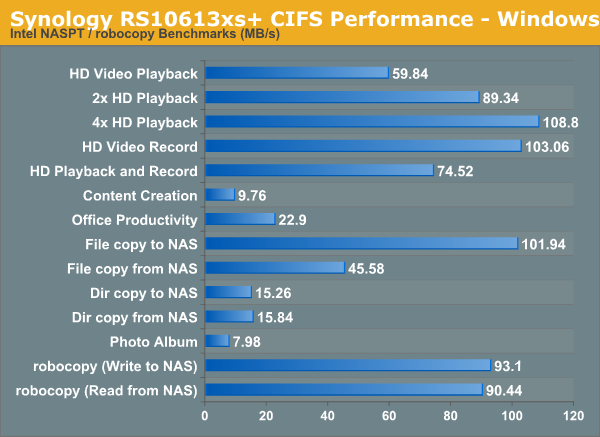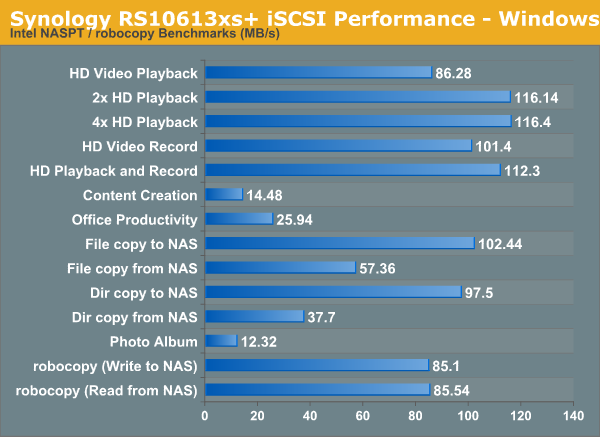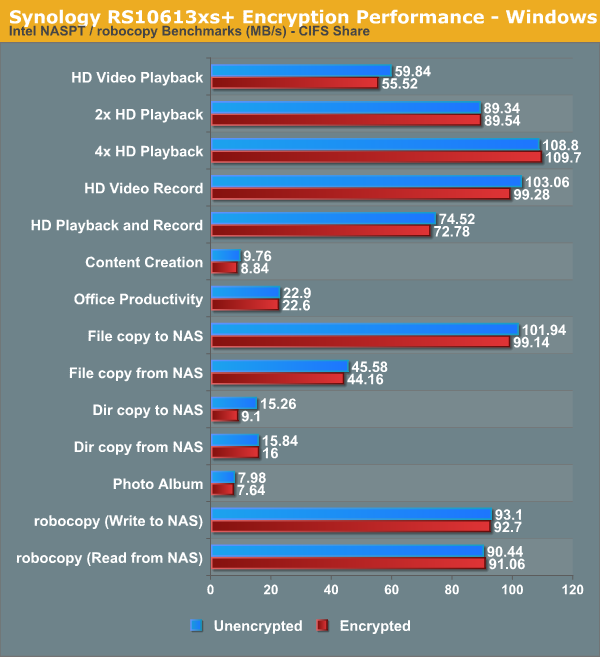Synology RS10613xs+: 10GbE 10-bay Rackmount NAS Review
by Ganesh T S on December 26, 2013 3:11 AM EST- Posted in
- NAS
- Synology
- Enterprise
Single Client Performance - CIFS and iSCSI on Windows
The single client CIFS performance of the Synology RS10613xs+ was evaluated on the Windows platforms using Intel NASPT and our standard robocopy benchmark. This was run from one of the virtual machines in our NAS testbed. All data for the robocopy benchmark on the client side was put in a RAM disk (created using OSFMount) to ensure that the client's storage system shortcomings wouldn't affect the benchmark results. It must be noted that all the shares / iSCSI LUNs are created in a RAID-5 volume.

We created a 250 GB iSCSI target and mapped it on the Windows VM. The same benchmarks were run and the results are presented below.

Encryption Support Evaluation:
Consumers looking for encryption capabilities can opt to encrypt a iSCSI share with TrueCrypt or some in-built encryption mechanism in the client OS. However, if requirements dictate that the data must be shared across multiple users / computers, relying on encryption in the NAS is the best way to move forward. Most NAS vendors use the industry-standard 256-bit AES encryption algorithm. One approach is to encrypt only a particular shared folder while the other approach is to encrypt the full volume. Some NAS vendors have support for both approaches in their firmware, but Synology only opts for the former. Details of Synology's encryption strategy can be found in this tutorial.
On the hardware side, encryption support can be in the form of specialized hardware blocks in the SoC (common in ARM / PowerPC based NAS units). In x86-based systems, accelerated encryption support is dependent on whether the AES-NI instruction is available on the host CPU (not considering units based on the Intel Berryville platform). Fortunately, the Xeon CPU used in the Synology RS10613xs+ does support AES-NI. So, we can expect performance loss due to encryption enabling to be minimal.
We enabled encryption on a a CIFS share to repeat our Intel NASPT / robocopy benchmarks. The results are presented in the graph below (with the unencrypted folder numbers for comparison purposes).

As expected, encryption carries almost no performance hit. In a couple of cases, the numbers seem to even favour the encryption case. It goes to show that the bottleneck is on the disk or network side for those cases, rather than the RAID and encryption-related computation on the NAS CPU.










51 Comments
View All Comments
JayJ - Friday, December 27, 2013 - link
In at least 2 of the links it is stated that when a RAID 5 rebuild is in process and a URE is encountered, all data is lost.I'm not sure what crap hardware that author has been using. When a URE is encountered during a rebuild the rebuild halts and you're back where you started - with a degraded array.
Now I'm not saying "RAID 5 is the BEST!" but the "facts" presented are false.
FYI I've rebuilt several hundred RAID 5 arrays over the last 15 years and have experienced a URE during rebuild exactly 2 times. You can cut down on UREs by performing a scheduled "Patrol Read" or functional equivalent. There is no way to know if the data is readable unless you read it. You can have a (fictional) "SUPER DUPER RAID 3000" with a ridiculous amount of redundancy but it's still theoretically possible to lose your data due to URE unless it's read and verified.
Computer Bottleneck - Saturday, December 28, 2013 - link
How do you feel about drives like the Western Digital Re which has a URE spec of 10^15 compared to other drives with a URE spec of 10^14 in RAID 5?802.11at - Friday, December 27, 2013 - link
Given the choice, I'll take RAID 10 all day in my enterprise environment.802.11at - Friday, December 27, 2013 - link
But FWIW, our HP LeftHand SAN is comprised of 6 nodes with 8 HDDs each in RAID 5 with the volumes actually running on a networked RAID 10.theangryintern - Monday, December 30, 2013 - link
Nice try, guy who writes for smbitjournalBrutalizer - Wednesday, January 1, 2014 - link
The second link is quite wrong in the premises. It says that filesystems are really reliable today, well, they are not. There are lot of research showing how all filesystems are flawed today (except ZFS) with respect to data corruption protection. Only ZFS protects the data against data corruption. Read the research papers you will find here:http://en.wikipedia.org/wiki/ZFS#Data_integrity
http://en.wikipedia.org/wiki/Hard_disk_error_rates...
tomdb - Thursday, December 26, 2013 - link
How much are consumer grade (if any exist) 10 GbE NAS's, switches and PCIe cards?bobbozzo - Thursday, December 26, 2013 - link
$3000 for a 6-bay Netgear w 10gigEhttp://www.anandtech.com/show/7523/netgear-launche...
bobbozzo - Thursday, December 26, 2013 - link
I don't think there are any 'consumer' 10gb switches yet.Master_shake_ - Saturday, December 28, 2013 - link
infiniband is getting cheaper in price